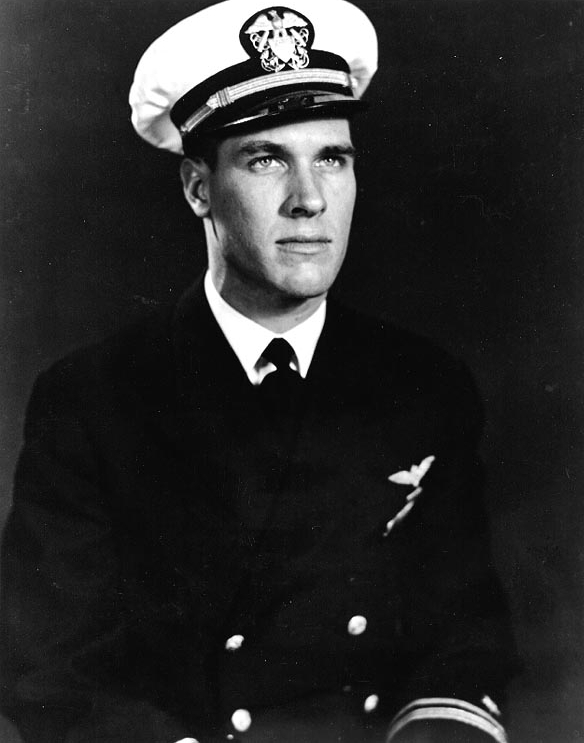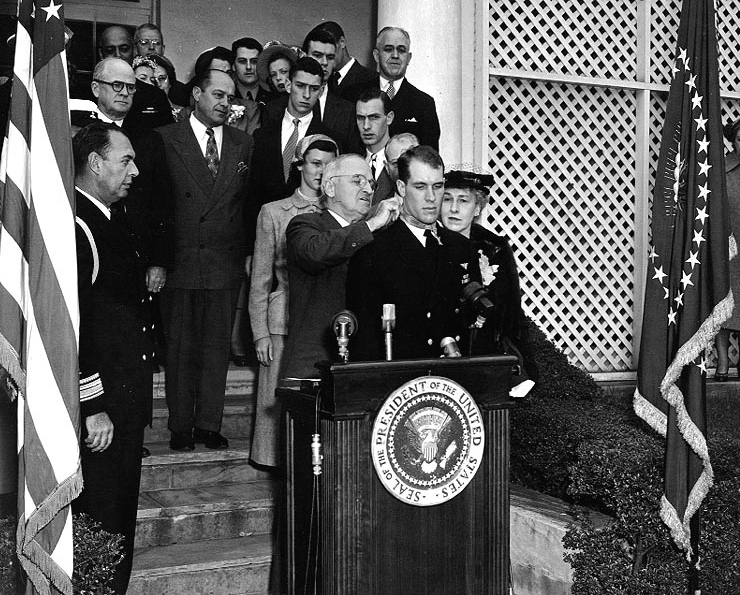 On 13 November, former officer of the United States Navy, naval aviator and recipient of the Medal of Honor, Thomas J. Hudner Jr. passed away, aged 93.
On 13 November, former officer of the United States Navy, naval aviator and recipient of the Medal of Honor, Thomas J. Hudner Jr. passed away, aged 93.
The heroic story of how Lieutenant Hudner received the Medal of Honor is one of brotherhood and loyalty, and is relayed in Thomas McKelvey Cleaver's book, The Frozen Chosen. Below is an extract from the book.
'Snow squalls fell from the dark sky, covering the heaving whitecaps of the slate-gray Sea of Japan. The mountains of North Korea came into view in the distance as the six dark-blue F4U-4 Corsairs of VF-32’s Iroquois Flight went “feet dry” north of the port of Hungnam. The rugged pine-covered mountains below were smoothed by snow drifts that might be ten feet deep. The six Corsairs made their way through a line of valleys, looking up at the cloud-shrouded peaks from their altitude of 500 feet over the rugged terrain. As they swept out of the last valley, the clouds broke to show the flat, windswept expanse of the desolate frozen Chosin Reservoir. It was Monday, December 4, 1950.
Iroquois Flight leader Lieutenant Commander Dick Cevoli banked north as they passed the ruined village of Yudam-ni, site of a deadly battle between the 5th and 7th Marine Regiments, 1st Marine Division and the Chinese “volunteers” led by Marshal Peng Dehuai that had only ended that morning as the 5th and 7th Marines successfully made their way through the 11 miles of Toktong Pass to the relative safety of the village of Hagaruri, site of division headquarters, a 96-hour battle that had cost the Marines 100 men per mile.
The Navy fliers’ job that day was reconnaissance, to locate any of the Chinese forces that had ambushed the Marines at every strongpoint they had held in the reservoir the previous Monday night, November 27.
Cevoli glanced over at his wingman, Lieutenant George Hudson. Beyond were the two Corsairs of the second element, Lieutenant (jg) Bill Koenig and Ensign Ralph McQueen. The third element, composed of element leader Ensign Jesse Brown and his wingman, Lieutenant (jg) Tom Hudner, were slightly to the rear. As the Corsairs winged their way over another mountain valley on the far side of the reservoir in the Tae Baek Mountains, Bill Koenig dropped beneath Brown’s Corsair. Suddenly his voice came over the radio: “Jess, check your fuel status.”
Brown glanced down at the gauges to see the fuel needle dropping alarmingly. Ahead, the ridgeline rose above his flight altitude. As he pulled back on the stick and soared over the ridge, he felt the engine stutter, and the rpms dropped sharply. “This is Iroquois One-Three. I’m losing power. I have to put it down. Mayday. Mayday.”
As Brown went through the drill of dropping his belly tanks and under-wing ordnance, wingman Tom Hudner pulled close alongside. “Okay, Jesse, I’ll walk you through the list. Lock your harness. Open your canopy and lock it.” Hudner saw the big bubble canopy on Brown’s Corsair slide back. As Brown’s nose dropped, Hudner warned, “Watch your airspeed.”
The other members of the flight could only watch helplessly as the Corsair dropped toward a bowl-shaped clearing on the side of a mountain. Brown lowered his flaps and set up to crash land. On the mountainside, the shadows of the trees were growing longer in the late afternoon sun.
Hudner winced as he watched the Corsair touch down in a cloud of snow and plow across the field, throwing up a rooster tail of snow behind until it came to an abrupt stop, nearly into the line of trees that bordered the clearing.
The five surviving Corsairs circled as their pilots anxiously watched for a sign of movement from their comrade. Hudner circled lower and spotted smoke wafting from beneath the broken cowling. “Get out, Jesse! Come on!” There was still no movement below. Hudner later recalled, “Somebody was going to have to go down and help. Since nobody else was volunteering, I decided it would have to be me.” Hudner ditched his ordnance and tanks and throttled back. “I’m going in.”
“Roger,” flight leader Cevoli responded. All was silence while Hudner set up for a carrier approach at minimum speed, flaps down. Lower... lower... lower...
As he saw the ground coming up fast, Hudner told himself: “This is really stupid, you know?”
“The ground seemed to rush at me as I hit, and then I was out of control, snowplowing across the field and hoping I was going to end up somewhere close to Jesse.” With a lurch, the Corsair slammed around 90 degrees and slewed to a stop. As the cloud of snow settled, Hudner could see he was about 80 yards from Brown’s smoking airplane.
Badly shaken from his crash landing, Hudner climbed out of his Corsair. As he recalled, “The snow was waist-deep, it was colder than I have ever experienced anywhere else, and at first I couldn’t move. It took me over thirty minutes to cover the distance to Jesse’s airplane, and I was damn near frozen stiff by the time I got there.”
Reaching Brown’s Corsair, Hudner discovered his friend’s legs had been crushed in the crash and it was impossible to pull him out of the cockpit because the fuselage had broken in such a way that he was jammed in the cockpit. The Corsair was still smoking. Hudner piled snow on the cowling to try and stop the flames. Brown slipped in and out of consciousness from loss of blood as Hudner fought to free him.
The sun was going down and it was even colder in the shadows. Hudner ripped at the instrument panel in an unsuccessful attempt to pry Brown loose. Finally, a Marine HO3S-1 helicopter from VMO-6 arrived. Hudner and the pilot, Marine Master Gunnery Sergeant Herbert Valentine (a World War II Corsair ace and Navy Cross recipient) tried to break the plane open with a fire axe. In the last light of day, when he had to go or die of frostbite himself, Hudner realized his friend had frozen to death in the cockpit. The helicopter lifted off in a cloud of snow and disappeared over the peaks to the east, leaving Jesse Brown and his Corsair in the frozen stillness.
 Hudner receiving the Medal of Honor from US President Harry S Truman
Hudner receiving the Medal of Honor from US President Harry S Truman
In March 1952, Lieutenant (jg) Thomas J. Hudner Jr. became the only member of the United States Navy to be awarded the Medal of Honor during the Korean War, for his willingness to risk his life above and beyond the call of duty in deliberately crash landing to save his friend. His award was one of 14 Medals of Honor awarded for heroism during the Chosin campaign, more than have been awarded for any other American battle.'
Rest in peace, Lieutenant Hudner.


Comments
You must be logged in to comment on this post. Click here to log in.
Submit your comment